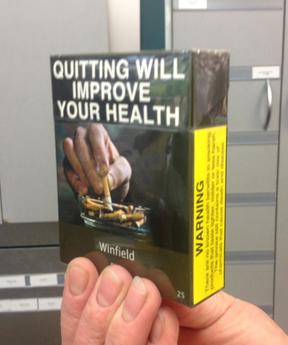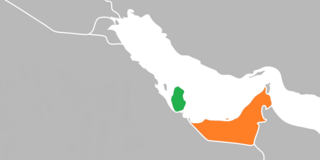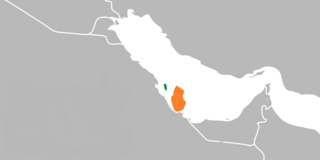
The Cooperation Council for the Arab States of the Gulf, also known as the Gulf Cooperation Council, is a regional, intergovernmental, political, and economic union comprising Bahrain, Kuwait, Oman, Qatar, Saudi Arabia, and the United Arab Emirates. The council's main headquarters is located in Riyadh, the capital of Saudi Arabia. The Charter of the GCC was signed on 25 May 1981, formally establishing the institution.
Dokha is a tobacco product, consisting of dried and finely shredded tobacco flakes mixed with herbs and spices. It originated in Iran during the 16th century. Unlike hookah tobacco, dokha is not cured with molasses. Users smoke the tobacco blend in small quantities using a pipe called a midwakh. Because the midwakh pipe is used almost exclusively for smoking dokha, the terms are often used interchangeably.
The Khaleeji was a proposed name for a common currency of the member states of the Gulf Cooperation Council (GCC).

Juma al Majid is an Emirati businessman, political adviser, and philanthropist. He is the founder and chairman of Juma Al Majid Holding Group. In 2016, Al Majid was ranked among the richest Arabs in the world.
The Peninsula Shield Force is the military arm of the Gulf Cooperation Council (GCC). It is intended to deter, and respond to military aggression against any of the GCC member countries: Bahrain, Kuwait, Oman, Saudi Arabia, Qatar, and the United Arab Emirates.

Hani Mansour M. Al-Mazeedi is a Kuwaiti scientist who specializes in halal requirements, quality and safety systems for food and halal services for the halal Industry.

LuLu Group International is an Emirati-based multinational conglomerate company that operates a chain of hypermarkets and retail companies, headquartered in Abu Dhabi, United Arab Emirates. It was founded in 2000 by M. A. Yusuff Ali from Nattika in Kerala, India. The Group mainly operates "Lulu Hypermarket", a chain of hypermarkets that ranks among the top grocers in many of the markets it operates in. LuLu has over 65,000 employees of various nationalities.
The Gulf Railway, also known as the GCC Railway, is a proposed railway system to connect all six Gulf Cooperation Council member states in Eastern Arabia. The rail network will have a total length of 2,177 km. The project is estimated to cost US$250 billion. It was scheduled to be completed by 2025, although as of 2023, construction work has yet to start.

Regulation of tobacco by the U.S. Food and Drug Administration began in 2009 with the passage of the Family Smoking Prevention and Tobacco Control Act by the United States Congress. With this statute, the Food and Drug Administration (FDA) was given the ability to regulate tobacco products.

Plain tobacco packaging, also known as generic, neutral, standardised or homogeneous packaging, is packaging of tobacco products, typically cigarettes, without any branding, including only the brand name in a mandated size, font and place on the pack, in addition to the health warnings and any other legally mandated information such as toxic constituents and tax-paid stamps. The appearance of all tobacco packs is standardised, including the colour of the pack.

Qatar and the United Arab Emirates share a naval border and are part of the Arabic-speaking Persian Gulf region. They are both members of the GCC.
The United Arab Emirates Federal Customs Authority is an Emirati governmental authority concerned with drawing customs policy in cooperation with customs administrations, preparing unified legislation to regulate customs work, and supervising implementation of it by customs administrations and related government authorities, and protecting the State from revenue fraud and smuggling operations in cooperation and coordination with competent authorities.
Qatar Charity is a humanitarian and development non-governmental organization in the Middle East. It was founded in 1992 in response to the thousands of children who were made orphans by the Afghanistan war and while orphans still remain a priority cause in the organization's work with more than 150,000 sponsored orphans, it has now expanded its fields of action to include six humanitarian fields and seven development fields.
The United Arab Emirates is a federation of seven Emirates, with autonomous federal and local governments. The UAE has historically been a low-tax jurisdiction. The federal government and local governments are entitled to levy taxes on citizens and companies. The federal government currently levies a value added tax, corporate income tax, and excise taxes. Some emirates levy property, transfer, excise and tourism taxes. Some emirates also charge corporate taxes on oil companies and foreign banks.

Bilateral relations exist between the State of Qatar and the Kingdom of Bahrain. They first began in 1971.
Migrant workers in the Gulf Cooperation Council region involves the prevalence of migrant workers in the Kingdom of Bahrain, the State of Kuwait, the Sultanate of Oman, the State of Qatar, the Kingdom of Saudi Arabia and the United Arab Emirates (UAE). Together, these six countries form the Gulf Cooperation Council (GCC), established in 1981. The GCC cooperates on issues related to economy and politics, and the subject of migrant workers constitutes a substantial part of the council's collaboration. All of the GCC countries are dependent on migrant labor to bolster and stimulate economic growth and development, as the GCC countries possess an abundance of capital while the domestic labor capacity is low. Although migrant workers in the Persian Gulf region amount to no more than 10% of all migrants worldwide, they constitute a significant part of the populations of their host countries.

The Qatar–Saudi Arabia diplomatic conflict refers to the ongoing struggle for regional influence between Qatar and the Kingdom of Saudi Arabia (KSA), both of which are members of the Gulf Cooperation Council (GCC). It is sometimes called the New Arab Cold War. Bilateral relations have been especially strained since the beginning of the Arab Spring, that left a power vacuum both states sought to fill, with Qatar being supportive of the revolutionary wave and Saudi Arabia opposing it. Both states are allies of the United States, and have avoided direct conflict with one another.
The GCC Games is a regional multi-sport event which involves participants from the Gulf Cooperation Council region. The GCC Games, a quadrennial multi-sport event, was established by the union and first held in 2011. There are numerous long-running GCC Championships for individual sports, including: the Gulf Cooperation Council Athletics Championships football, Archery, athletics, Badminton, sailing, basketball, Swimming, Marathon Swimming, Diving, Water Polo, Artistic Swimming, tennis, gymnastics, weightlifting, futsal, snooker, Cycling, Chess and table tennis. The 3rd edition of the game had to be organized in June 2019, but held in 2022 due to the internal issues between the GCC state countries. The 4th edition has been announced and will happen as per the announced dates. For the first time the games will be organized by the new, young and talented faces of GCC team.

Gulf Conformity mark, also known as G-mark is a certification mark used to indicate products that conform to all technical regulations of the Gulf Cooperation Council. It means that the G-marked products meet all requirements of the corresponding technical regulations and have passed all conformity assessment procedures. The mark was introduced in 2009.

Oman–Turkey relations are the foreign relations between Oman and Turkey. Turkey's historic relationship with Oman has wavered between friendly indifference and courtship, but mutual differences were set aside in 2002 when the new Turkish government embraced a policy of engagement with Oman.










